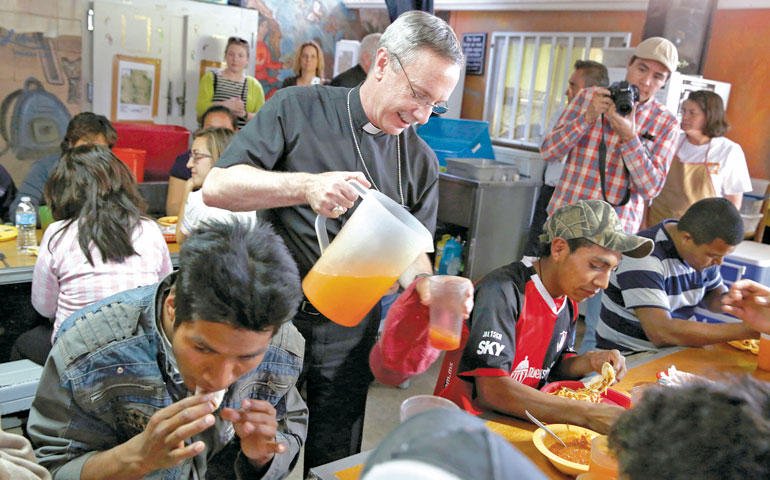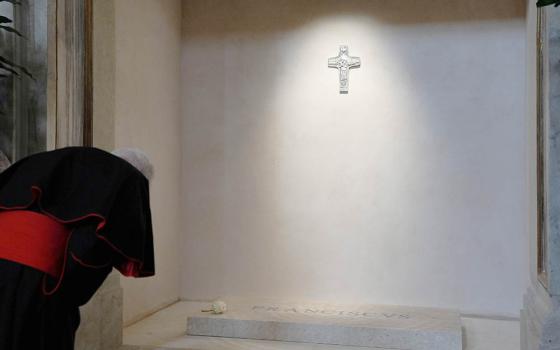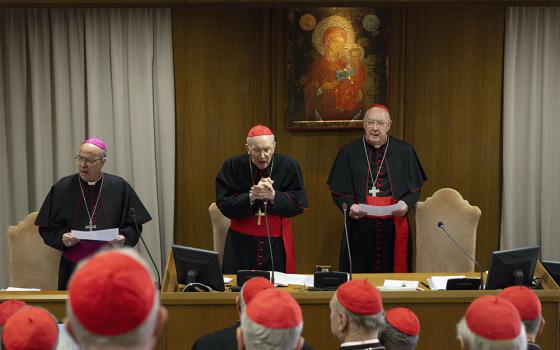
Auxiliary Bishop Luis Zarama of Atlanta serves juice to men at the Aid Center for Deported Migrants in Nogales, Mexico, March 31. Dinner that evening was served by visiting U.S. bishops. (CNS/Nancy Wiechec)
In recent years, the U.S. Conference of Catholic Bishops has focused most prominently on fighting the controversial contraception mandate and struggling against same-sex marriage laws, issues that have aligned them with the Republican Party.
The bishops mounted a "Fortnight for Freedom" twice to call attention to religious liberty, but could not agree on a statement about poverty. The conference still released the required letter opposing budget cuts to programs that aid the poor. But the days when Catholic bishops could be counted on to be at the forefront of the fight for social justice seemed like a distant memory.
On March 30-April 1, however, the conference sponsored an event, "Our Lampedusa," at the border between the U.S. and Mexico in Nogales, Ariz. The bishops of the Committee on Migration were joined by Boston Cardinal Sean O'Malley, chairman of the Pro-Life Committee, for a tour of the border, after which they served dinner at a shelter for migrants on the Mexican side. On April 1, they had a Mass along the border fence, passing out Communion through the slats in the border fence to Mexican Catholics who had gathered on the other side. They laid a wreath for all who had died in the crossing. The images were powerful, and the next morning, Google News listed 194 articles about the event.
"People ask, 'When will you see the Francis effect?' and we saw it at the border as our bishops courageously acted and spoke as Francis has acted and spoken," said John Carr, who worked at the bishops' conference for 25 years and now leads the Initiative on Catholic Social Thought in Public Life at Georgetown University.
Referring to the Italian island where migrants try to enter Europe illegally and which Francis visited last year, Carr continued, "This desert and fence is our Lampedusa, our 'isle of tears.' Cardinal O'Malley and his brother bishops broke out of the 'This is the way we always do it' mentality and made the case for our teaching, our people, the best of our nation's values in a new and compelling way."
The event at the border may have marked a turning point for the church in the U.S., a return to a studied nonpartisanship combined with a type of public advocacy that relies on witness more than lawsuits.
"In the space of a week, we had a 10-year-old pleading for her father's freedom to the pope, Pope Francis urging President Obama to act more boldly for justice for immigrants, and Cardinal O'Malley at the border making the moral and human case for immigration reform as people reached through the fence to receive the body of Christ," Carr said. "This is not simply creative advocacy. This is the church being the church in every way. It put a place and a face on a problem, turned a political controversy into a moral challenge, made the Washington excuses sound small and hollow, and made continued delay seem petty and partisan."
The question remains: Will it make a difference? When the bishops' conference withheld its support for the Affordable Care Act, many Democrats on the Hill thought the decision cost the conference a great deal of its credibility. The problem with immigration reform is different: Do the Republicans think they can take the bishops' support for granted? Do they think a decision to not pass immigration reform will cost them?
After the 2012 election, when a GOP presidential candidate garnered a mere 27 percent of the Latino vote, Republicans promised they were ready to move on immigration reform. Simple math indicates that you do not win national elections when you get less than a third of the fastest-growing demographic in the country.
Last year, the Senate passed a bipartisan, comprehensive immigration bill by the astoundingly wide margin of 68-32. One of the architects of the compromise, Sen. Marco Rubio of Florida, soon backed away from his own handiwork when the tea party voiced its vociferous objection. Rubio, the most prominent Republican Latino in the country, had provided a great deal of cover to other Republican senators by supporting the bill. It is doubtful a similar bill could now pass without his support and in what will likely be a more conservative Senate after the midterm elections.
The Senate bill is stalled in the GOP-controlled House. Over the past few months, Speaker John Boehner of Ohio has indicated he would prefer to approach the issue with a series of small, discrete reforms, passed one at a time. Other times, he has indicated the issue is dead. Other times, he appears open to passing a comprehensive bill. One thing is clear: The votes are there to pass the Senate bill. All 200 Democrats are pledged to support it and more than 25 Republicans have indicated their support. Two hundred eighteen votes are all that is required.
Passing immigration reform "would demonstrate that both Boehner and the Republican Party are serious about addressing a major public policy problem facing the country," said politics professor Matthew Green of The Catholic University of America.
But Green, who is an expert on Congress, warns, "Immigration is a tough issue to tackle without angering key constituencies." Boehner has wrestled with his fractious caucus over spending bills and the vote to raise the nation's debt ceiling, but so far, he has not confronted them on an issue like immigration reform, to which much of the party's base is deeply hostile.
The decision to allow a vote forces Boehner to weigh the party's short-term and long-term interests. "In the short run, I doubt it will make much difference to the Republican Party whether it helps enact immigration reform," Green said. "The party is likely to keep the House in November, and it may well win control of the Senate too. But in the long run, I don't see how the party can win national elections -- nor the growing number of Latino voters -- without showing leadership on immigration."
Sadly, in Washington, short-term considerations tend to dominate, especially in the House, which stands for re-election every two years.
It is difficult to predict what effect the bishops' event at the border will have on Boehner's decision. By all accounts, Boehner takes his Catholic faith seriously and the Mass at the border was powerful. "The church can't and won't play the business-as-usual Washington game," Carr said. "We don't make campaign contributions. We don't offer endorsements. At our best, we bring together fervent prayer, powerful ideas, everyday experience, courageous leaders, and passion for the poor and weak. All those came together at the border in urgent and powerful ways."
If the business-as-usual approach has not gotten immigration reform across the finish line yet, maybe the prayers of the bishops will do the trick. The lives of 11 million souls hang in the balance.
[Michael Sean Winters writes about religion and politics on his Distinctly Catholic blog.]



